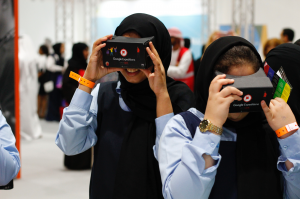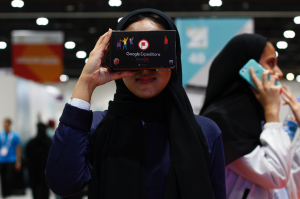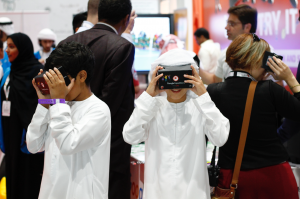1 Million Virtual Reality Expeditions for Students in Middle East in 2018
VRXOne go-to school program spreads great awareness about Virtual Reality in Education, and implementation in classroom is now possible.”
MANAMA, BAHRAIN, December 28, 2017 /EINPresswire.com/ -- Virtual Reality or VR is one of the most remarkable and fastest-growing technologies in the present day. Over time Virtual Reality has become an increasingly familiar term but for many the nature of this technology may still not be obvious. VR is a computer generated, three- dimensional environment offering a synchronized, orchestrated experience that can be explored and manipulated. A person experiencing a VR program becomes a part of this virtual world and is able to interact with objects around them and even perform a series of actions. This ability to be immersed in the environment and interact with it creates a sense of presence for the person, and this is where the terms immersive technology and realism come in which are the defining characteristics of virtual reality.— Dr. Sana Farid - Co-Founder & CEO
This sense of presence is exactly what makes the VR an ideal contender for its role in education as an advanced technology. With this heightened sense of belonging in an environment, it is easier to learn, explore and store information. Compared to passive learning methods and conventional visual aids, VR technology not only provides graphic memory but also sensory memory – the reasons VR is referred to as an experiential learning technology.
To demonstrate the potential of VR in education, Google Expeditions have been taking millions of students on virtual tours worldwide. In the Middle East, Munfarid Consulting and Google Expeditions have been working together to introduce VR as an education technology in classrooms. Taking the efforts one step further in 2018, Munfarid has taken it up to conduct a million Expeditions in schools in the Middle East as part of VRXOne Go-to-School program so that the teachers and students together can explore the potential of this technology within their classroom environment. The students will be able to experience the VRXOne kits in their classrooms and give a first-hand review of their virtual tours.
Munfarid is a Bahrain-based innovation company offering consultancy in immersive AR/VR/Ai technologies to government, non-governmental and corporate sector organizations. Specializing in providing incisive learning strategies, operational management and customizable AR/VR/Ai aided performance solutions, Munfarid has showcased VR technology at various platforms throughout this year – Worldskills Competition 2017, Bahrain Entrepreneurship Week, Education Experts Conference, Edutech Middle East 2017, Seedstars MENA 2017, to name a few.
Having successfully served over 2 million students across different countries, Google Expeditions has already been creating success waves during its Pioneer Program. More than the fact that students have shown great excitement to experience the technology, Expeditions have remarkably strengthened their learning abilities and information retention level by providing an immersive environment for exploration and inquisition. Where on one hand, students get to learn more comprehensively than any conventional method could offer before, Expeditions also help teachers teach better by igniting students’ natural curiosity and getting them interested in their lessons.
This is what’s in store for Middle Eastern students next year, when they will be able to go on exciting immersive, virtual journeys without even leaving the premises of their classrooms. Since the way Expeditions work differs from showing mere photos or videos as the students have to turn their heads and eyes to view scenes, students will actually get to “experience” their lessons and learn according to their natural inquisitive tendencies. This is a great opportunity for students as well as institutes to be able to take part in this program by VRXOne where Google Expeditions share their copyrighted content with a million students completely free of cost.
This is indeed a huge step forward for Middle East in education technology bringing the institutes closer to the government’s vision for implementation of advanced and modern technologies within learning and development. The year 2017 itself has been indeed very promising for VR as the spending on the technology has doubled up from $6.1 billion in 2016 to $13.9 billion this year. Virtual reality headset sales are actually projected to double every year until it reaches a saturation point around 2025. The app for Google Cardboard has been downloaded over 10 million times and the total number of virtual reality users is expected to reach 171 million by 2018.
The worldwide VR software and hardware market size is expected to reach a whopping $41.5 billion by 2020. These are huge statistics for VR technology promising significant developments and bright future for the technology just round the corner. It will be exciting to discover and document the effectiveness of VR in classrooms during the VRXOne Go-to-School program in ME, as the future mainstream education technology.
Hajra Khan
Munfarid Consulting Co. SPC.
+97366656613
email us here
Legal Disclaimer:
EIN Presswire provides this news content "as is" without warranty of any kind. We do not accept any responsibility or liability for the accuracy, content, images, videos, licenses, completeness, legality, or reliability of the information contained in this article. If you have any complaints or copyright issues related to this article, kindly contact the author above.



